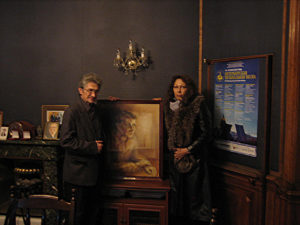Composer Gregory Korchmar wrote his cantata If I were known as a violin bow in St. Petersburg, Russia, starting the composition in August 2012 and finishing in February 2013. The eight-movement composition, scored for soprano, violin and cello, sets texts from ten poems by a fellow St. Petersburg native, artist and writer Tatyana Apraksina. The texts selected by Korchmar reflect meditations on the metaphysics of music and musical performance. Korchmar’s and Apraksina’s resonance with St. Petersburg’s musical traditions informs the cantata, as do related spiritual and cultural affinities.
Gregory Korchmar, a composer, pianist, harpsichordist and professor who studied under the Soviet composer Dmitry Shostakovich (1906-1975), has long been a visible exponent of St. Petersburg’s musical culture. He teaches composition at the St. Petersburg Conservatory and since 2006 has chaired the St. Petersburg Composers Union, having previously assisted the prominent composer Andrei Petrov (1930-2006), his predecessor in that post. For many years, Korchmar has served as the primary organizer for the annual Petersburg Musical Spring festival of contemporary classical music. He is the author of four symphonies and a series of operas, ballets, cantatas, oratorios and other choral and solo vocal works. He is an Honored Artist of the Russian Federation (1996), a laureate of the St. Petersburg government’s prize for work dedicated to the city’s three-hundredth anniversary (2003), and the recipient of a Pushkin Medal for contributions to the development, preservation and proliferation of national cultural traditions.
Tatyana Apraksina’s visual and philosophical investigation of the specifics and spirit of classical music performance was significantly furthered by the St. Petersburg Philharmonic, which began to facilitate this direction in her work starting in 1984, while Shostakovich associate Yevgeny Mravinsky (1903-1988) still conducted the ensemble. Major musical and scholarly centers in Russia and abroad have hosted her exhibits and lectures on creativity, artistry and cultural history, themes also explored in her ongoing essay and poetry publications. Collaboration with original members of Shostakovich’s preferred Borodin Quartet, including cellist Valentin Berlinsky (1925-2008), has had a major influence on her thought, as has the noted St. Petersburg violinist and Soloists of Leningrad founder Mikhail Gantvarg, a central muse for her art and writing. Her two jubilee-year memorial portraits of Shostakovich belong to the collection of the St. Petersburg Composers Union, as does her 1996 portrait of the composer’s favorite pupil, Boris Tishschenko (1939-2010), an important ally for her work.
The “voices” and “hands” of these mutual “friends” interweave in the texts and music of Korchmar’s cantata, as does Western and Eastern musical rite’s “frankincense of canon.” Korchmar’s opening movement sets Apraksina’s restatement of a Pythagorean-type creed of musical cosmology. His chronologically last setting, placed at the cantata’s center, gives a pentatonically inflected evocation of the legendary meeting between the sages Confucius and Lao Tse, as imagined in a 1999 poem dedicated by Apraksina to the sinologist Evgeny Torchinov (1956-2003), her professor at the St. Petersburg branch of the Russian Academy of Sciences’ Institute of Oriental Studies. The closing movement, “To the Violinist’s Hand,” musically follows the trajectory of “whirlwind ascent” of sound from virtuosically played instruments, with the musical anagrams of Bach and Shostakovich fused in the culminating sonic “communion” envisioned in Apraksina’s 2001 source poem. Interstitial slow and waltz movements seem to extend other lines suggested by late-period Shostakovich, in varied moods of pastoral lyricism (“I discovered my violin…,” “A mountain cello…”), existential starkness (“The measurement for my love’s weight…”) and rhapsody in the “transmutation” of creative immersion in the sublime materials of musical craft (“My friends are notes…,” “Fetish”).
The cantata’s texts, written in anticipation of and during the early stages of a productive sojourn in coastal California, alternately seek to articulate the essence of Apraksina’s known experience of “music culled from altars” of “distinguished stage boards” from a vantage point of “gathering distance” an “ocean” and “continental stage” away from St. Petersburg, while also finding the wild setting’s “wave bows,” “vapor fingers” and “cello range” unlocking further layers of this essence for reporting back to the Old World, to “deliver information to the bureau.” In St. Petersburg, Korchmar responds with music steeped in that place, in the larger heritage of classical music and culture, and in headily transcendent “notes and numbers” sensed as measuring “heaven’s interval” and signifying the “vibration” that reconciles places, times, modes of thought and being for both composer and poet.
James Manteith, also the translator of Apraksina’s poem sequence California Psalms (bilingual edition 2013, Radiolarian) and other works by the author, has prepared an English-language singable rendering of the soprano part for Korchmar’s If I were known as a violin bow cantata, broadening the opportunities for the performance and comprehension of the work beyond Russia.
To inquire about this work’s recording and performance status and availability in its Russian or English versions, please contact apraksinblues@gmail.com.


Speak Your Mind